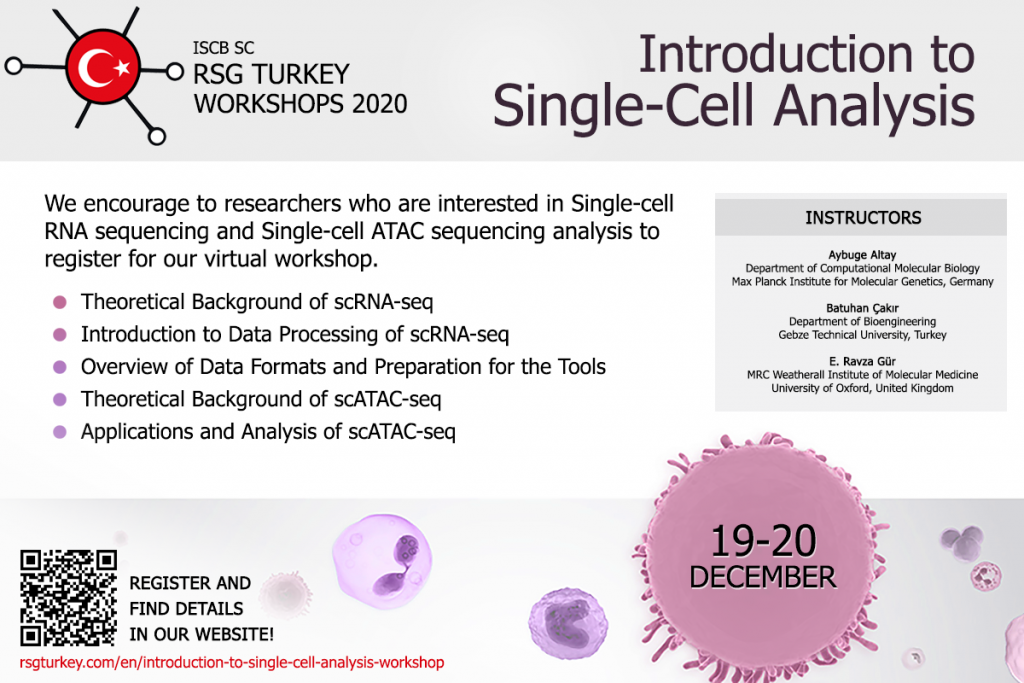RSG Turkey keeps going to organize their hands-on workshops! Within a year, We organized two different hands-on workshops for young researchers who want to improve their skills in the field of bioinformatics and computational biology. First of them is Python Programming workshop for bioinformatics: AnkaPy (for visit: https://github.com/rsgturkey/AnkaPy ) which held on 25-29 November 2019 in Ankara. Secondly, during the annual student symposium, we have been organized online workshops named Introduction to R programming, Machine learning with R programming and Data visualization with ggplot on 23-24 October 2020. (for visit: https://github.com/rsgturkey/Workshop2020 ).

Here, we present our novel workshop titled “Introduction to Single-cell Analysis” which will be held on 19-20 December 2020. Our workshop will be conducted online (by Zoom) due to Covid19. So, we encourage to researchers who are interested in Single-cell RNA sequencing and Single-cell ATAC sequencing analysis to register for this virtual workshop. The workshop will be conducted by two different Single-cell approaches. The first day of the workshop will cover the Single-cell RNA sequencing techniques and data analysis. The second day will present more specific approaches and applications about scATAC-seq analysis.
As RSG Turkey, we are grateful to our instructors;
E. Ravza Gür, Batuhan Çakır, and Aybuge Altay for their kind support and valuable contributions.
First day of the workshop:
RNA sequencing (RNA-seq) is a technique to measure the quantity of RNA molecules in a sample by using next generation sequencing (NGS) technology. With transcriptomics techniques like RNA-seq, it is possible to detect genes that are expressed significantly different between conditions to learn more about activities of the pathways of interest. A common type of RNA-seq (which is called bulk RNA-seq) produces the average transcriptome of those cells, however their gene expression is not the same even the cell types are the same. With single-cell technologies, it is possible to measure levels of molecules of interest from individual cells. One of those technologies, single-cell RNA-seq (scRNA-seq) allows us to measure RNA quantities in each cell. In this workshop, we will see what scRNA-seq is, why it became very popular, and what the benefits of this technology are. Also, we will have a tutorial about the basic steps of scRNA-seq analysis using R package called Seurat.
Second day of the workshop:
One of the main drivers of diversity in mammalian tissues is gene regulation – the way cells control which molecules are expressed from the information in their genome. This can be achieved in various ways. In one, chromatin structure determines whether the DNA sequence is accessible to potential regulators like transcription factors (TFs). This structure, which can be measured with methods like ATAC-seq, is highly dynamic and changes over time, but within specific types of cells, there are stereotypical patterns of organization that can be used to draw certain conclusions. While these methods provide a full readout of a genome, they generally require large numbers of cells and therefore can’t characterize the unique properties of single cells or types. To tackle this problem, advances in technologies have helped produce methods to sequence single cells (sc). In this workshop we will explore the scATAC-seq data: how it is generated, what kind of information it provides and why it is important? We will also have hands-on experience for the analysis of scATAC-seq data using the recently developed R package ArchR.
Deadline: 12.12.2020
WORKSHOP PROGRAM
| DAY 1 | |
| 10.45-11.00 | Opening Speech |
| 11.00-12.00 | Theoretical Background of scRNA-seq Batuhan Çakır |
| 12.00-12.15 | Short Break |
| 12.15-13.00 | Introduction to Data Processing of scRNA-seq E. Ravza Gür |
| 13.00-14.00 | Lunch & Networking |
| 14.00-15.00 | Overview of Data Formats and Preparation for the Tools Batuhan Çakır |
| 15.00-15.15 | Short Break |
| 15.15-16.30 | scRNAseq analysis (Seurat) Batuhan Çakır |
| Closing | |
| DAY 2 | |
| 11.00-11.10 | Opening Speech |
| 11.10-12.00 | Theoretical Background of scATAC-seq I E. Ravza Gür |
| 12.00-12.15 | Short Break |
| 12.15-13.00 | Applications and Analysis of scATAC-seq I Aybuge Altay |
| 13.00-14.00 | Lunch & Networking |
| 14.00-14.45 | Theoretical Background of scATAC-seq II E. Ravza Gür |
| 14.45-15.00 | Short Break |
| 15.00-16.00 | Applications and Analysis of scATAC-seq II Aybuge Altay |
| Closing |
